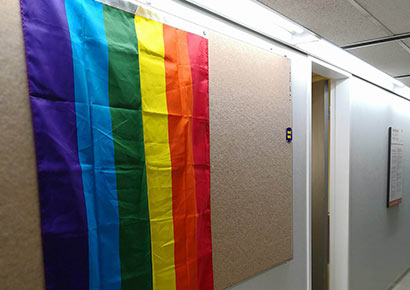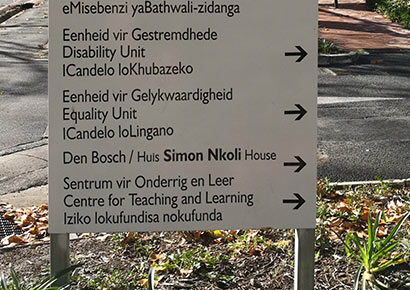From Vierkleurs to Rainbows: Queering Stellenbosch University
 When I applied to pursue a postgraduate degree at Stellenbosch University, I was apprehensive. It was the year of Open Stellenbosch and the stories of religious fundamentalism, conservatism, racism, sexism and homophobia shrouded my thoughts. I was sitting in London, homesick and longing to return to my beloved South Africa. The thought of entering such a volatile and exclusive space brought knots to my stomach.
When I applied to pursue a postgraduate degree at Stellenbosch University, I was apprehensive. It was the year of Open Stellenbosch and the stories of religious fundamentalism, conservatism, racism, sexism and homophobia shrouded my thoughts. I was sitting in London, homesick and longing to return to my beloved South Africa. The thought of entering such a volatile and exclusive space brought knots to my stomach.
“Stellies will be plan B, if all else fails” I thought to myself. Little did I know that in that very moment I was initiating a completely unexpected Queer journey at the very same institution that produced the likes of Hendrik Verwoerd. Try figure that one out?
It was now the beginning of 2016 and plan A had failed. As someone with the great privilege of being able to continue with my studies, I decided, like many Others, to suck it up and complete my education, even though I was entering what I thought was a snake pit for anyone considered to be “different”. I have been open about my sexuality since the age of 16 and I wasn’t prepared to hide a thing. This was a fresh start, and although I knew that my white skin and male appearance would give me the privilege of disguise, someone would find out eventually. As any Queer person knows, entering new spaces is always difficult. Coming out to people that you know is somewhat easier than coming out to strangers on a daily basis.
At postgraduate level you are expected to start unravelling your research interests, particularly in light of a required research project that is due towards the end of the year. In an attempt to further exert my heteromasculinity I decided to pursue my interests in security studies. What a better way to demonstrate my “manliness” than to explore my fascination with war, right? Wrong. Things weren’t connecting, I wanted something more. I began to find it difficult to invest in my work. There was, however, one class that gave me that critical edge that I was craving: International Relations Theory. I had always been adverse to the T-word, it represented an academic jargon that was far too complex for my mind, or so I thought.
It was in this class that I was first introduced to the word “Queer.” Once a derogatory phrase, it has since been re-appropriated in many forms; as a mode of disruption, identity, praxis, political formation and critical lens, among others. Although I had heard it before, I had purposefully chosen to disengage from it as this was far too much discomfort for my internalised homophobia to handle. When it was mentioned this time round, something inside me raged with excitement. This was my first engagement with Queer scholarship which, unbeknown to me at the time, invited me into a whole world of unknown Otherness. Was it actually possible to study LGBTQ politics? By the end of that week I had changed my entire research focus to a LGBTQ theme and adopted a new supervisor. It felt like a second coming out, except this time it was to my (academic) self.
All of a sudden, I realised the possibilities of academia, and more specifically, Queer academia. It was okay to write and speak in my capacity as a gay man, in fact, in the Department of Political Science, it was encouraged. Slowly but surely, as my Queer journey unravelled, as I cast away my internalised homophobia, I started to “see the light” as it were. Not only did my department host the SARChi Chair for Gender Politics, it was also deeply invested in critical thinking, including the exploration of LGBT and Queer studies.
I am not saying that being gay has helped me get to where I am today. What I am saying is that being unapologetic about my gayness has.
As is the case throughout South Africa, spaces in Stellenbosch have complex histories and subsequent contradictions. My office overlooks a broad area that once housed the South African Bureau for Racial Affairs, the centre of apartheid thinking. This was the place where the Eugenic motivations were concocted in order to commit some of the worst crimes against humanity (I have news for you Kallie Kriel and Afriforum), including forced sterilisations, biochemical and medical experimentation on people of colour and homosexuals, among others. Yet here I am, sitting in the former BJ Vorster Building at a desk covered in LGBTQ literature, writing a Masters thesis on Queer Global Politics.
This certainly does not distract me from the realities of Stellenbosch as an institution today, particularly with regards to enforced norms as well as gendered, racial and sexual disparities. Whilst to some extent my own Department and Faculty may be a slight exception within the broader context of the University, there is no doubt that transformation should remain at the forefront of the agenda. In fact, through engaging with critical lenses, I have felt ever-more exposed to these realities and duty-bound to call them out. Changing an institution from within, or as Queer scholars would say “Queering” (as verb) an institution (challenging/disrupting norms, binaries and power-structures), may still prove to be the most effective tool for transformation in all senses, whether it be on the basis of race, gender, sexuality, nationality, religious non/affiliation and/or ability.
Every day that I walk down the Verwoerdian-Goth institutional passageways of my department I see hate-crime posters, LGBTQ flags, proud-black-fists, women, and symbols of change. As Stellenbosch University celebrates its centenary, I can’t help but feel satisfied with how such scenes so blatantly raise the middle-figure to the ghosts that haunt these corridors. In fully acknowledging the need to speak truth to power and to demonstrate material changes, these symbolic gestures and shared stories play an imperative role in disrupting norms and anti-transformative narratives on all sides of the spectrum. As such, the work of individuals, Departments and Faculties must be acknowledged within the broader Higher Education transformation project. The renaming of the Stellenbosch University Equality Unit to Simon Nkoli House, for example, represents far more than a simple change of signage.
 Since enrolling at Stellenbosch University I have been afforded opportunities to teach, research, participate in an international exchange and engage with a diverse array of scholarship. I have also been lucky enough to interact with some of the greatest minds in Political Science, International Relations and Queer studies, and I have only my “Other” self to thank for that. I am not saying that being gay has helped me get to where I am today. What I am saying is that being unapologetic about my gayness has.
Since enrolling at Stellenbosch University I have been afforded opportunities to teach, research, participate in an international exchange and engage with a diverse array of scholarship. I have also been lucky enough to interact with some of the greatest minds in Political Science, International Relations and Queer studies, and I have only my “Other” self to thank for that. I am not saying that being gay has helped me get to where I am today. What I am saying is that being unapologetic about my gayness has.
As a testament to this I hang a large LGBTQ “rainbow” flag outside my office every day. More than just representing inclusivity, it also represents the Queering and disruption of space, of our institution and of academia more broadly. I do it because I can, and because once upon a time I could not. I also do it because I think symbols are important, especially here. I specifically want it to resonate with those who felt as I once did. I want students, staff and parents to know that although this was, and can continue to be, a violent space for Others, it can also be a space of growth, empowerment and immense opportunity for all, as it rightfully should.
James Lotter is a MA & SARChi: Gender Politics Scholar in the Department of Political Science at Stellenbosch University. This article was first published by Daily Maverick.
Leave a Reply